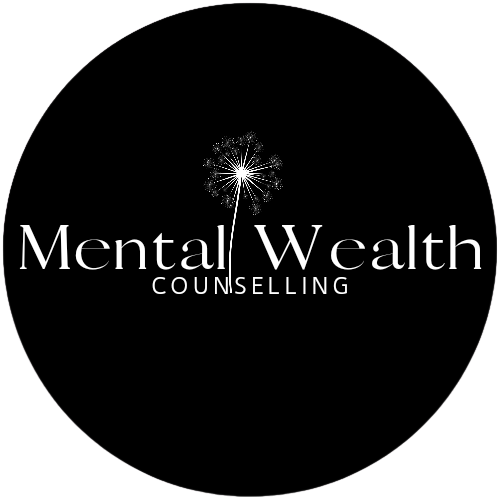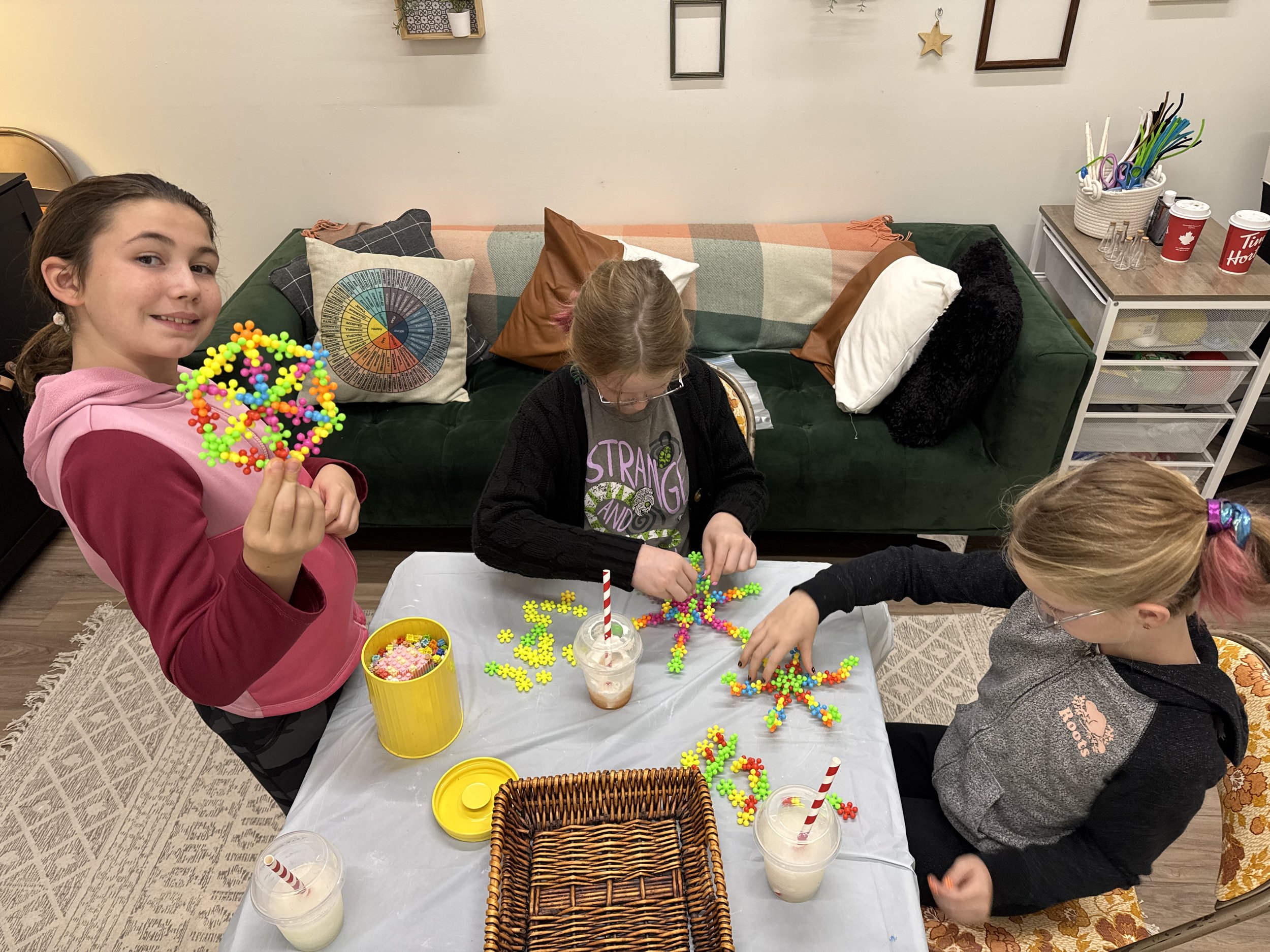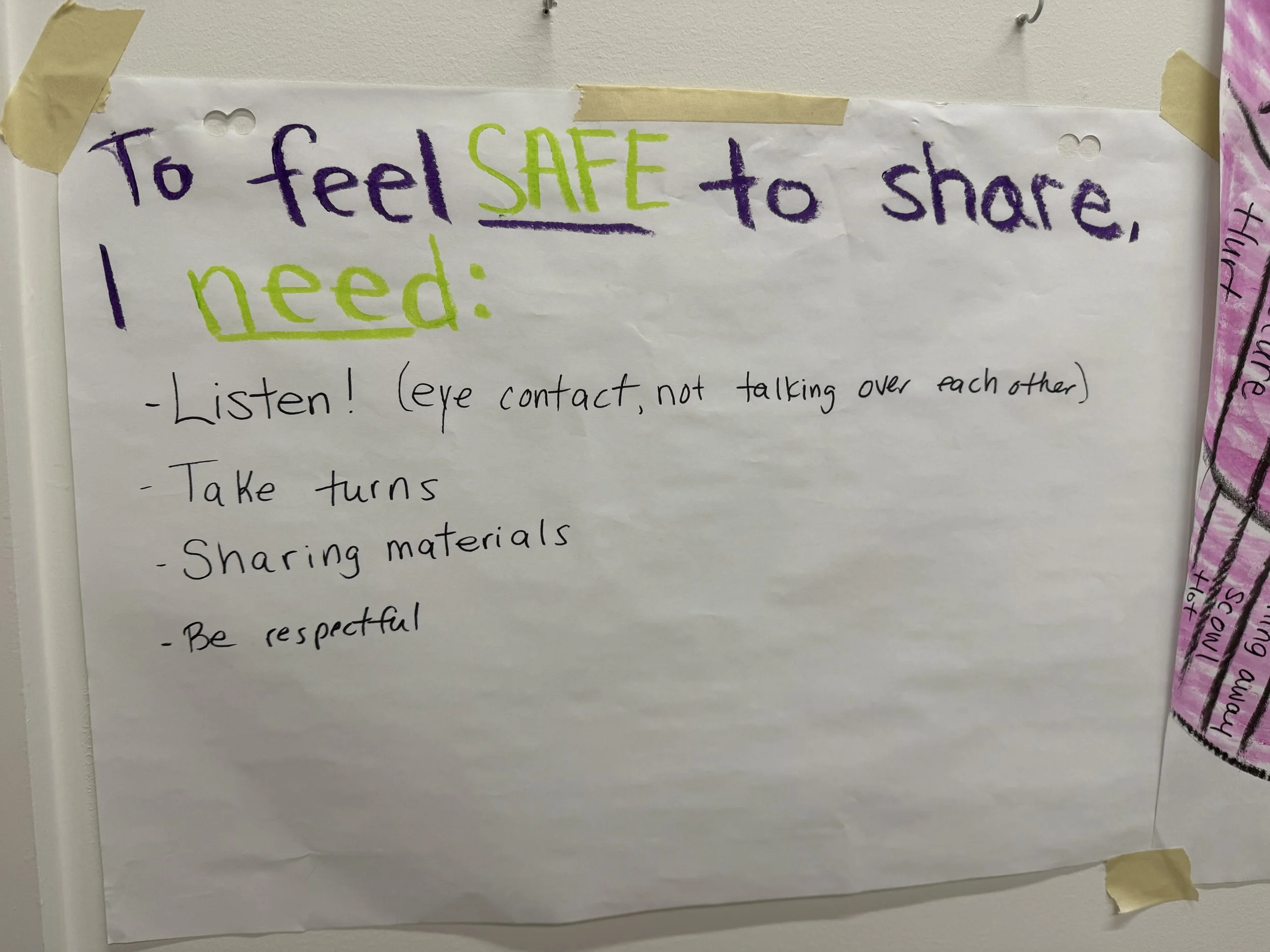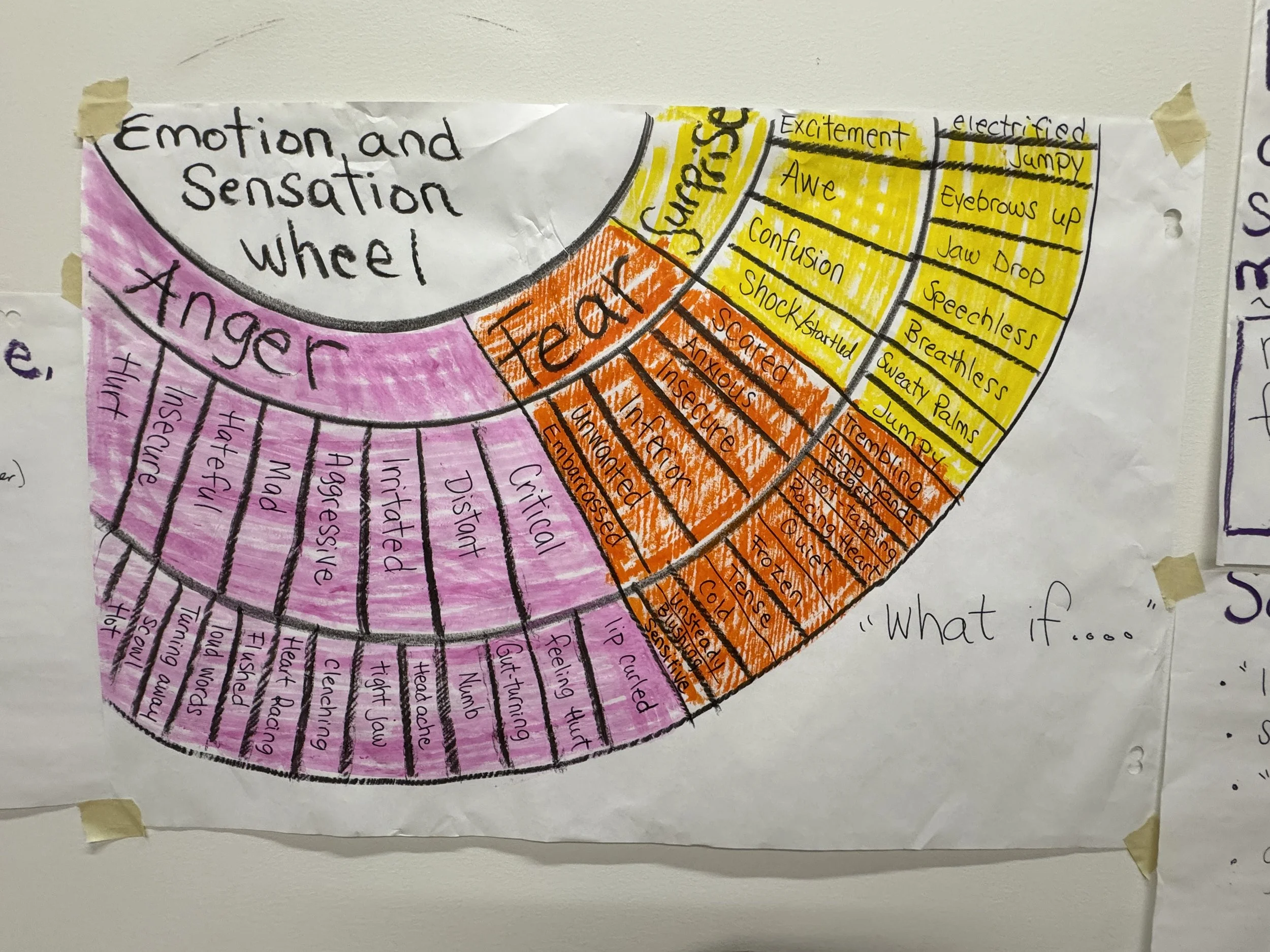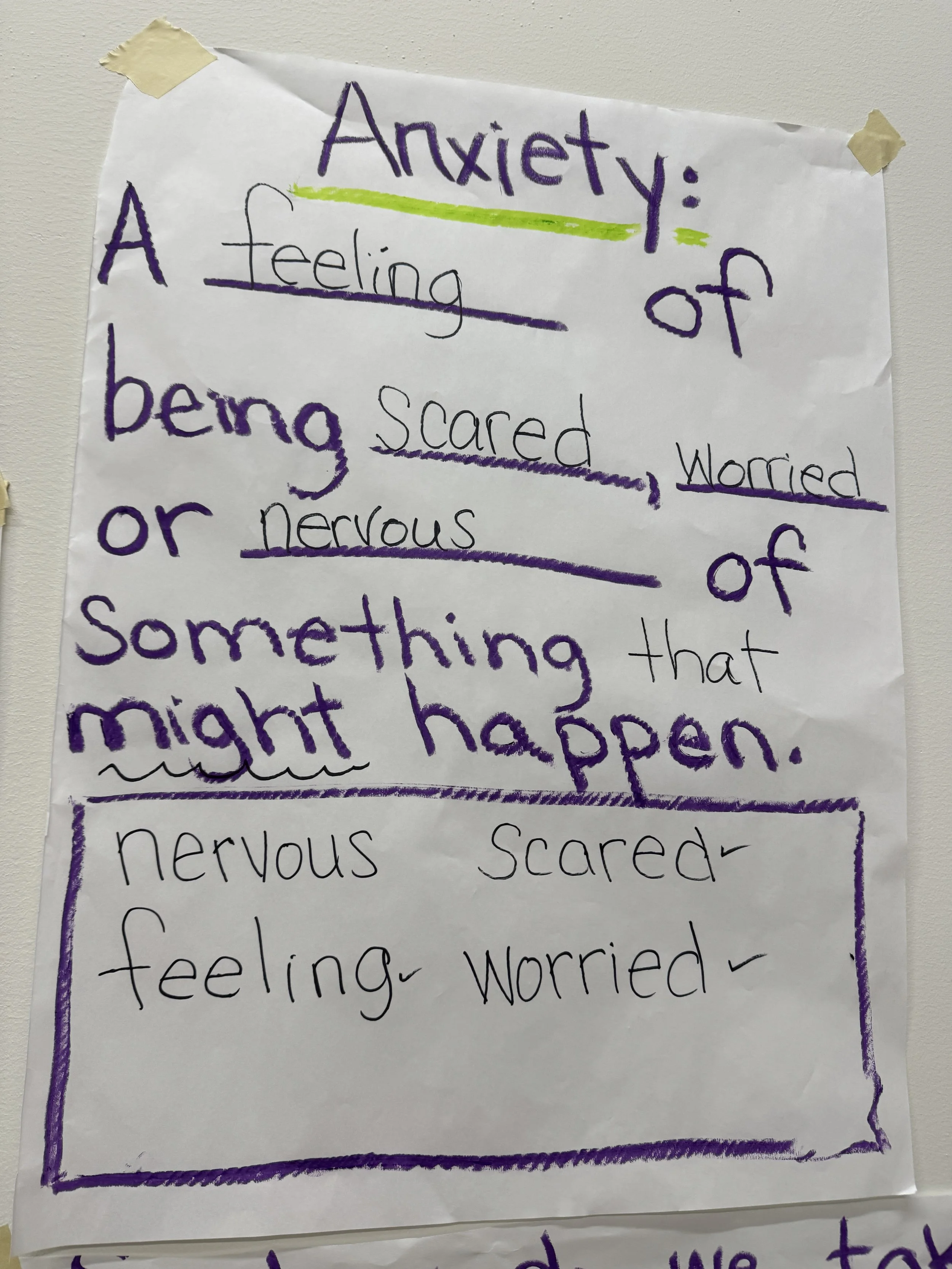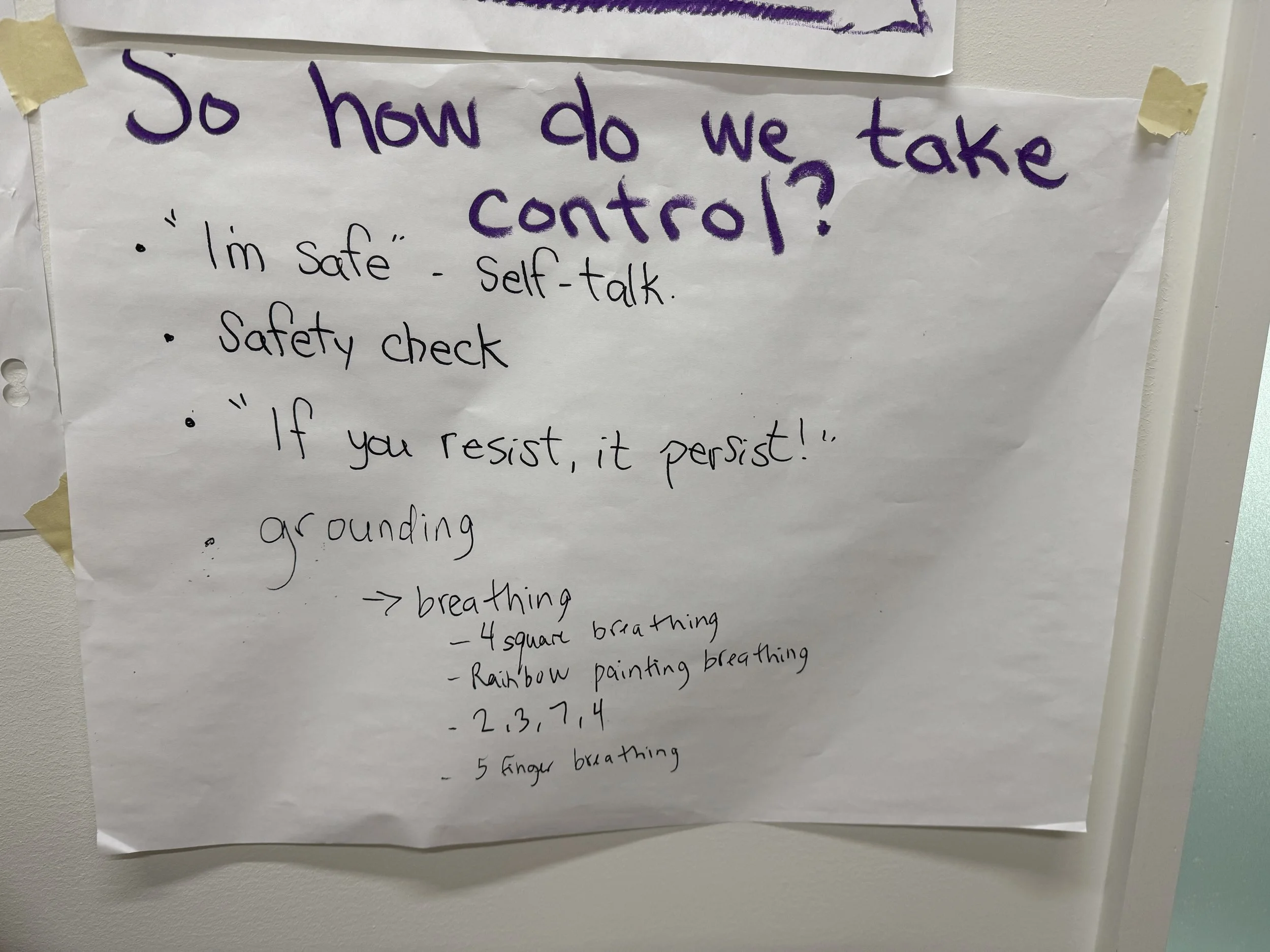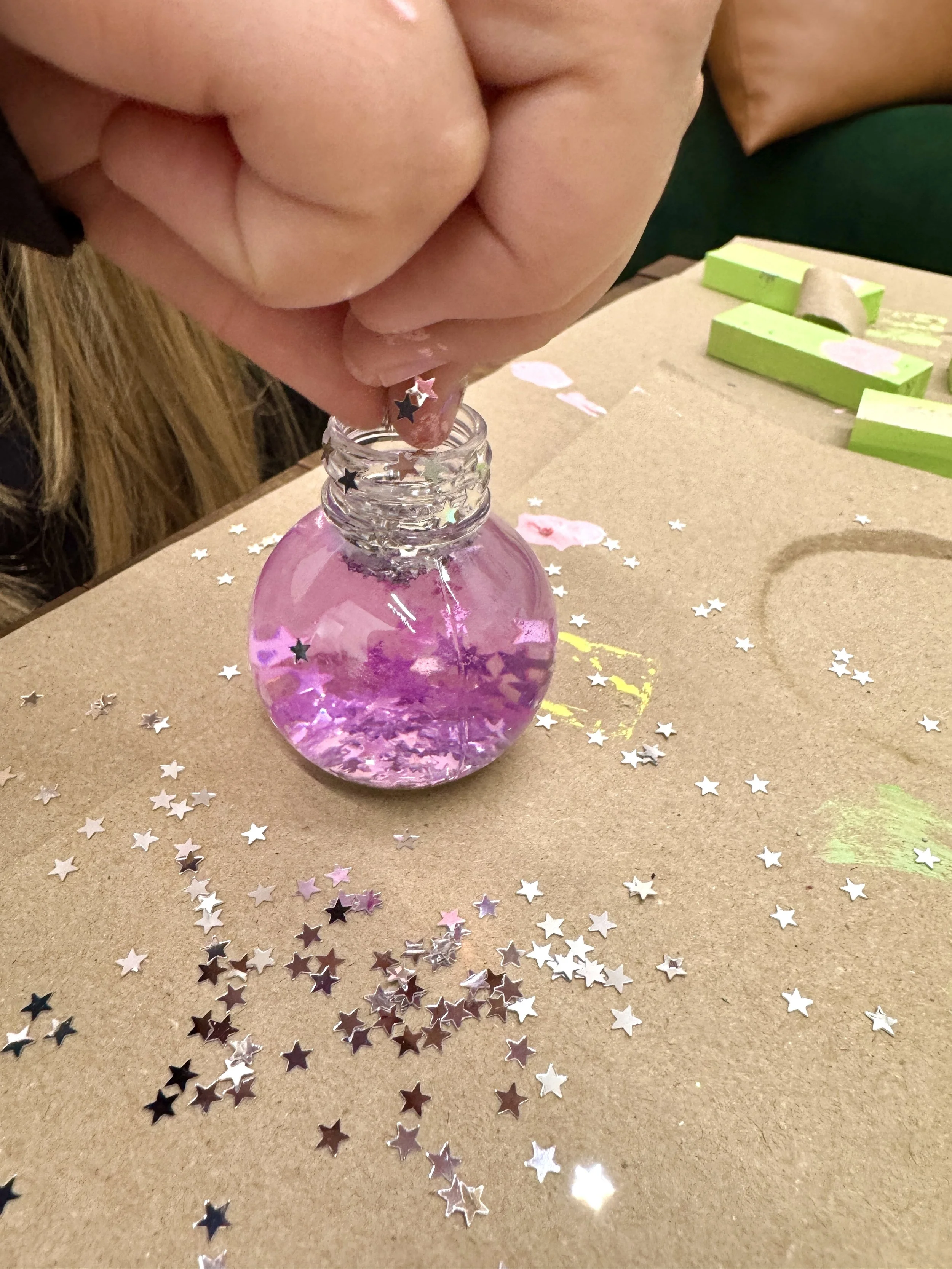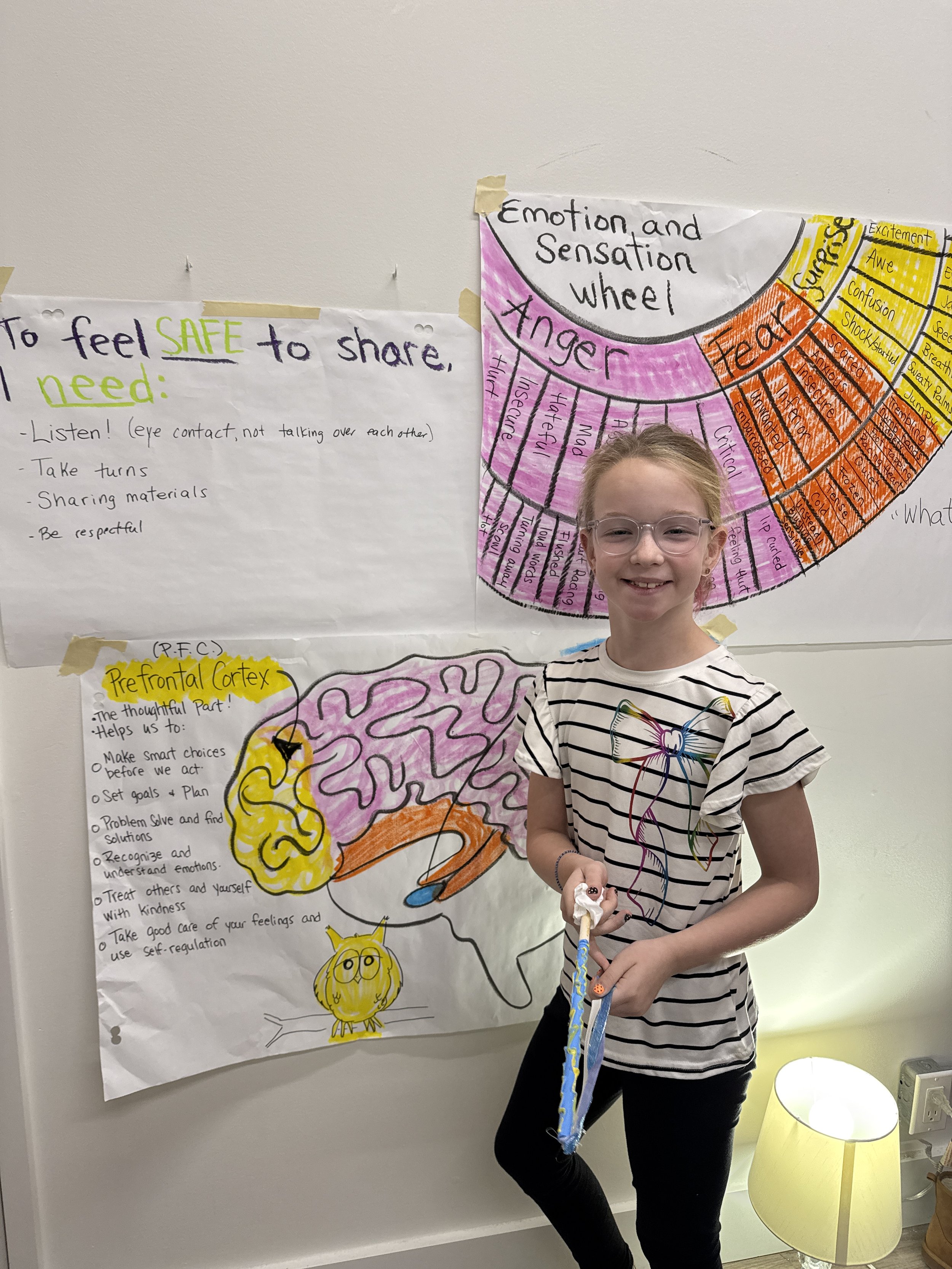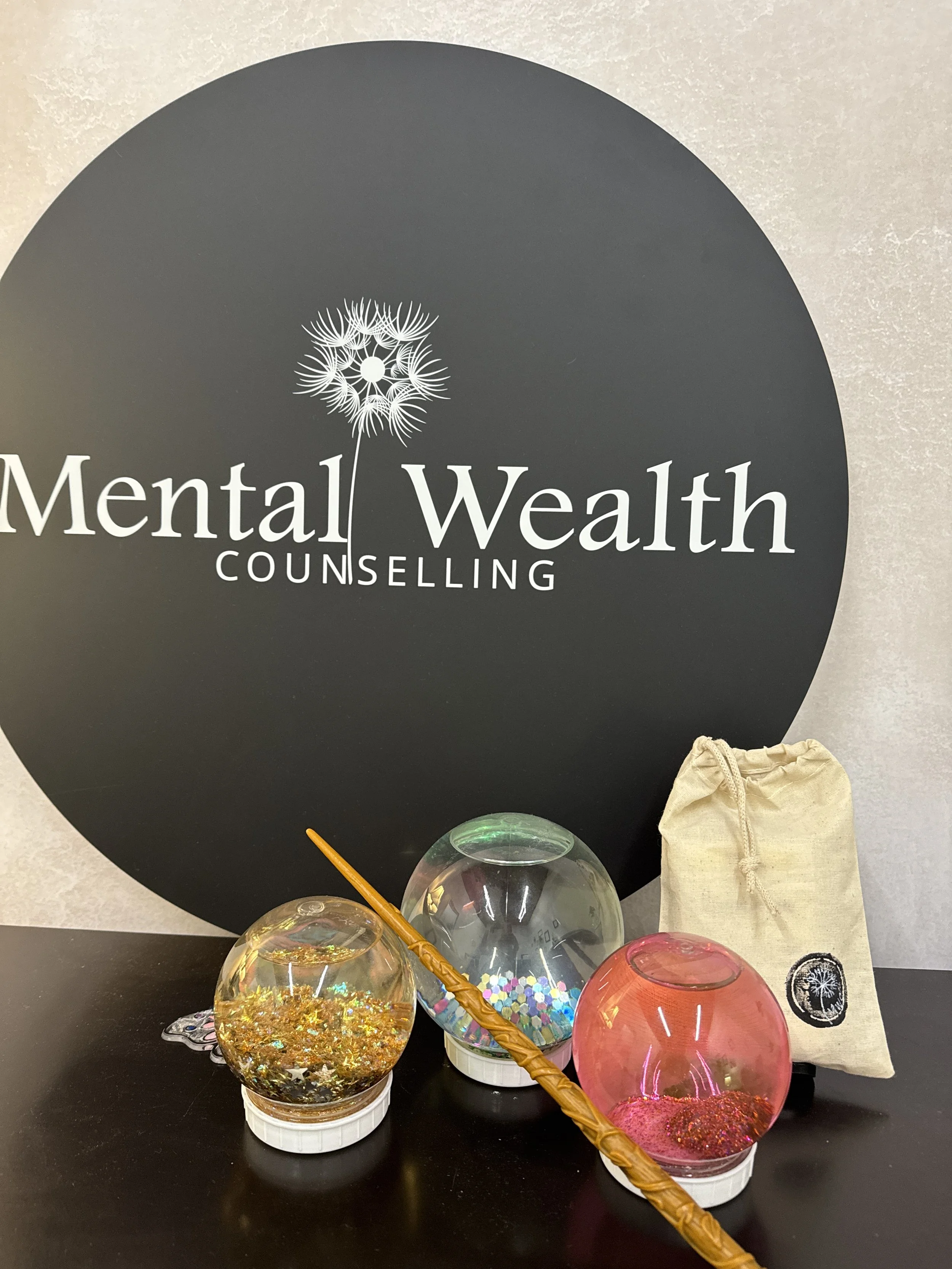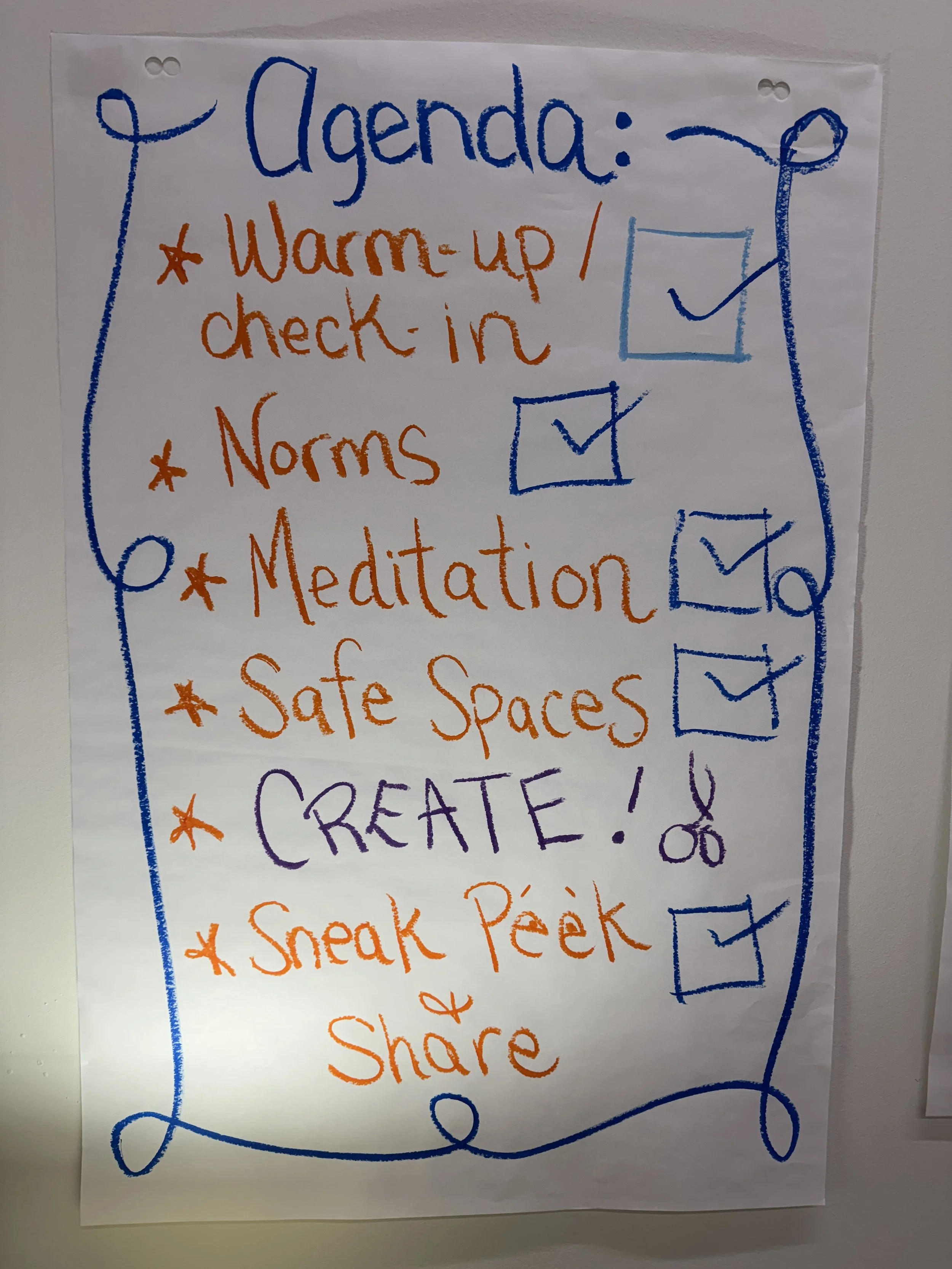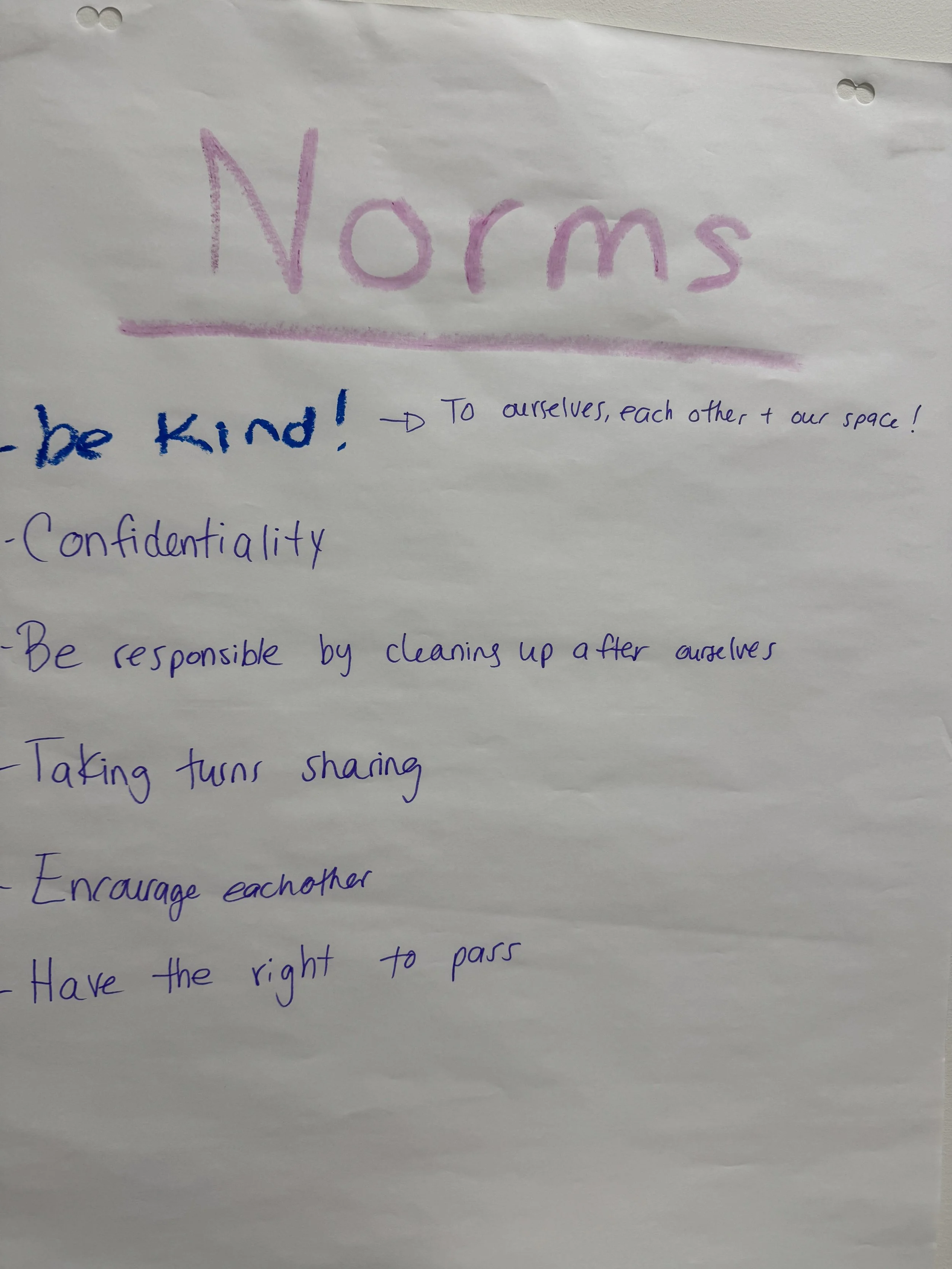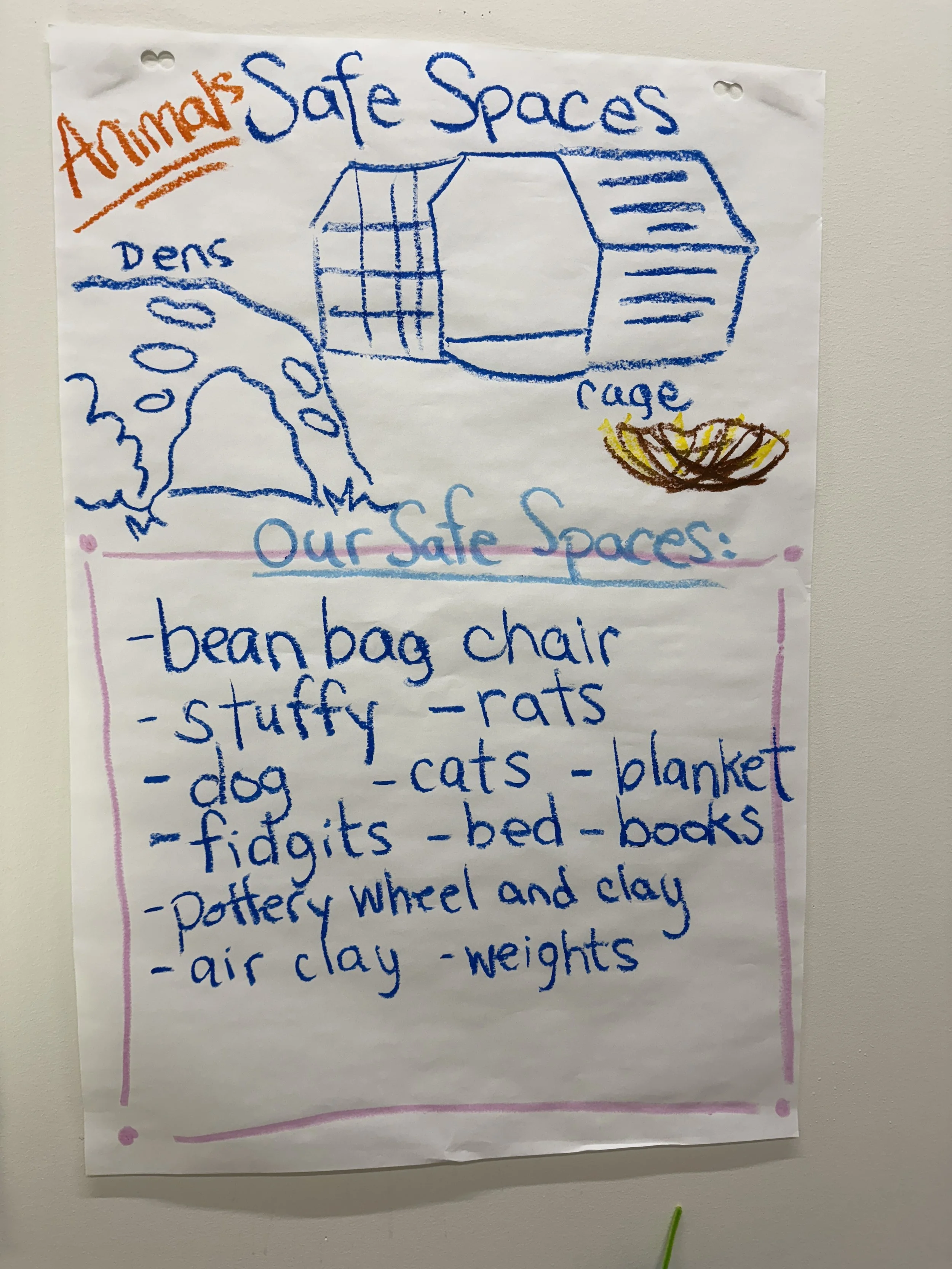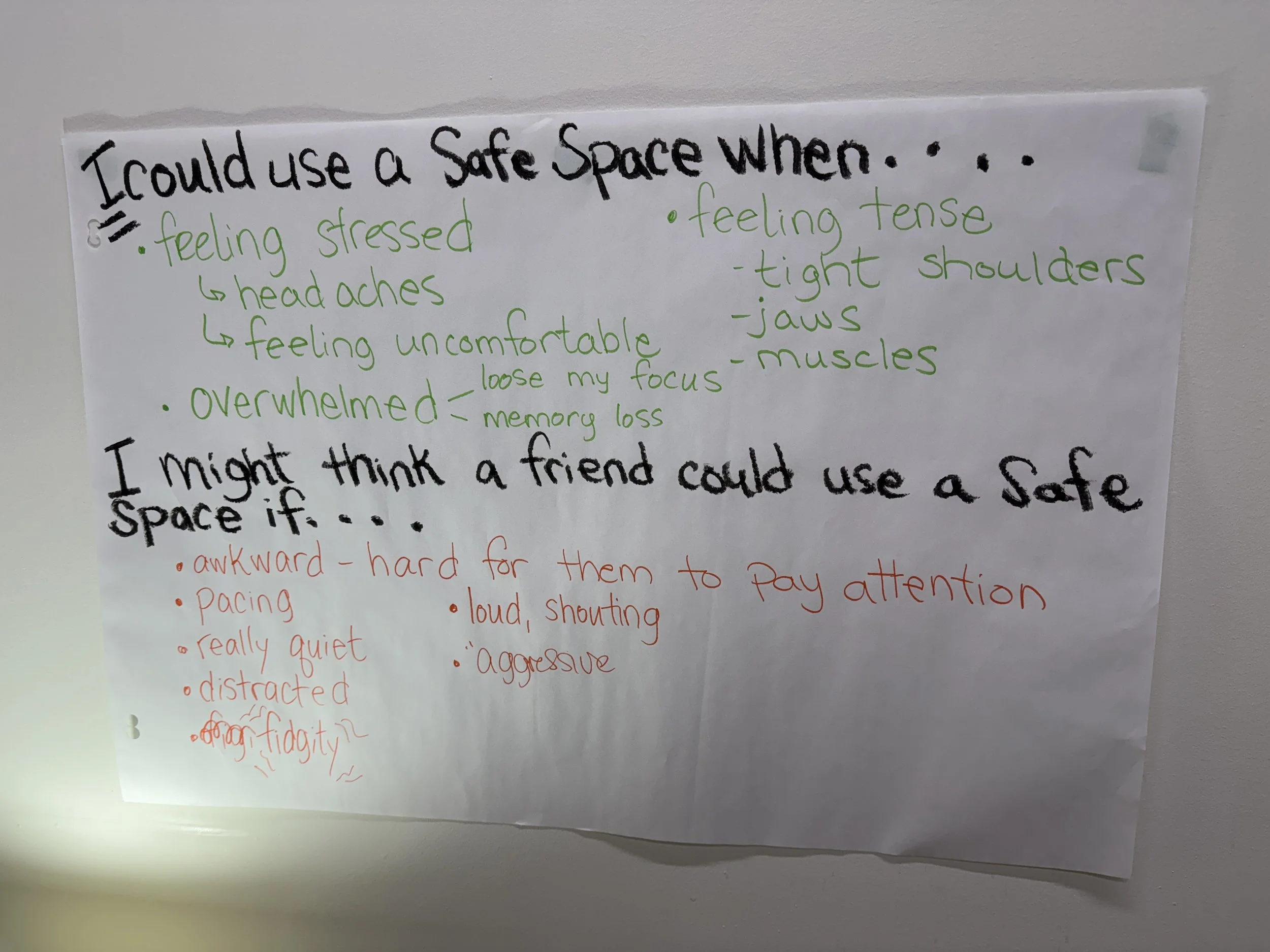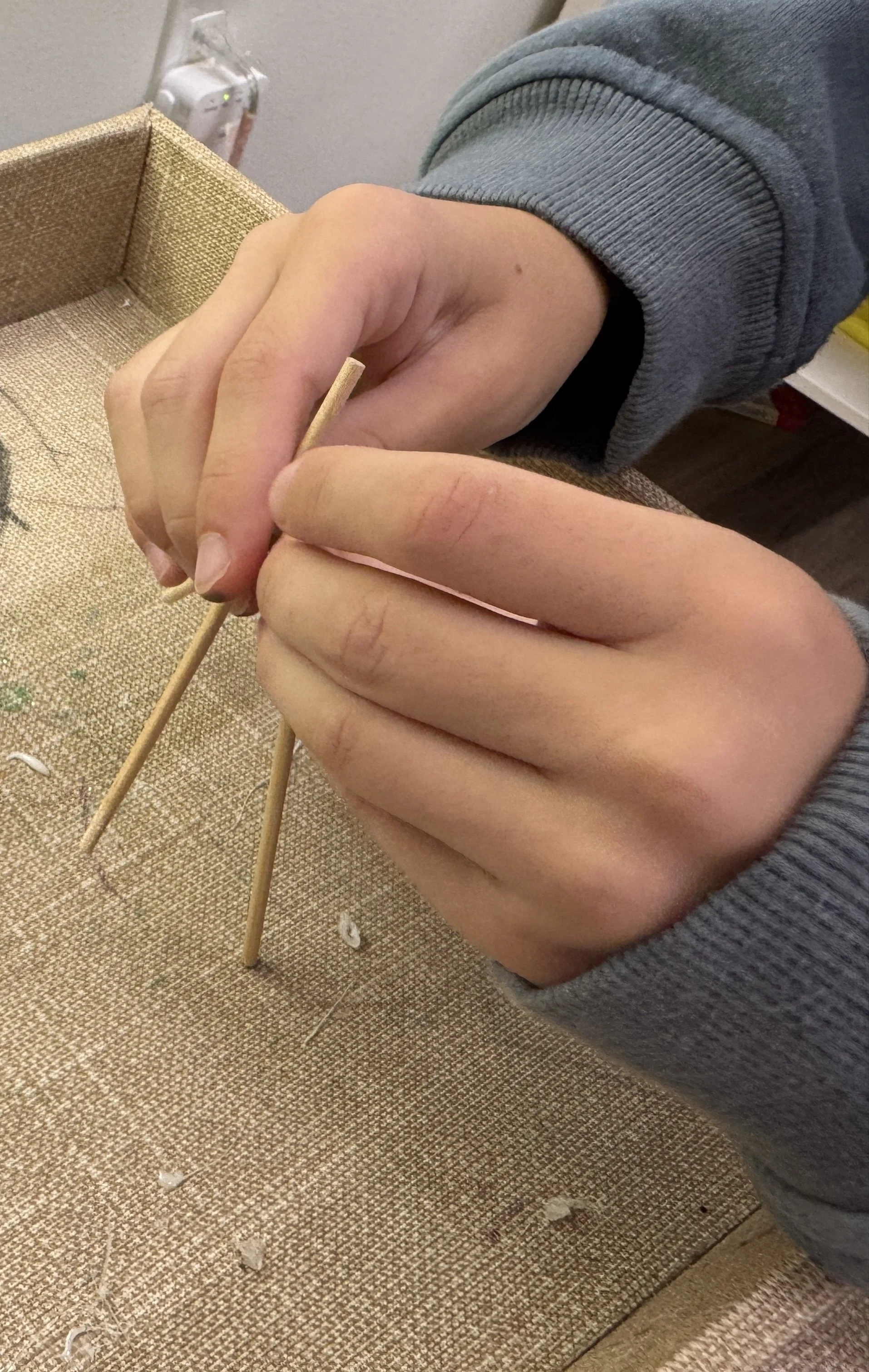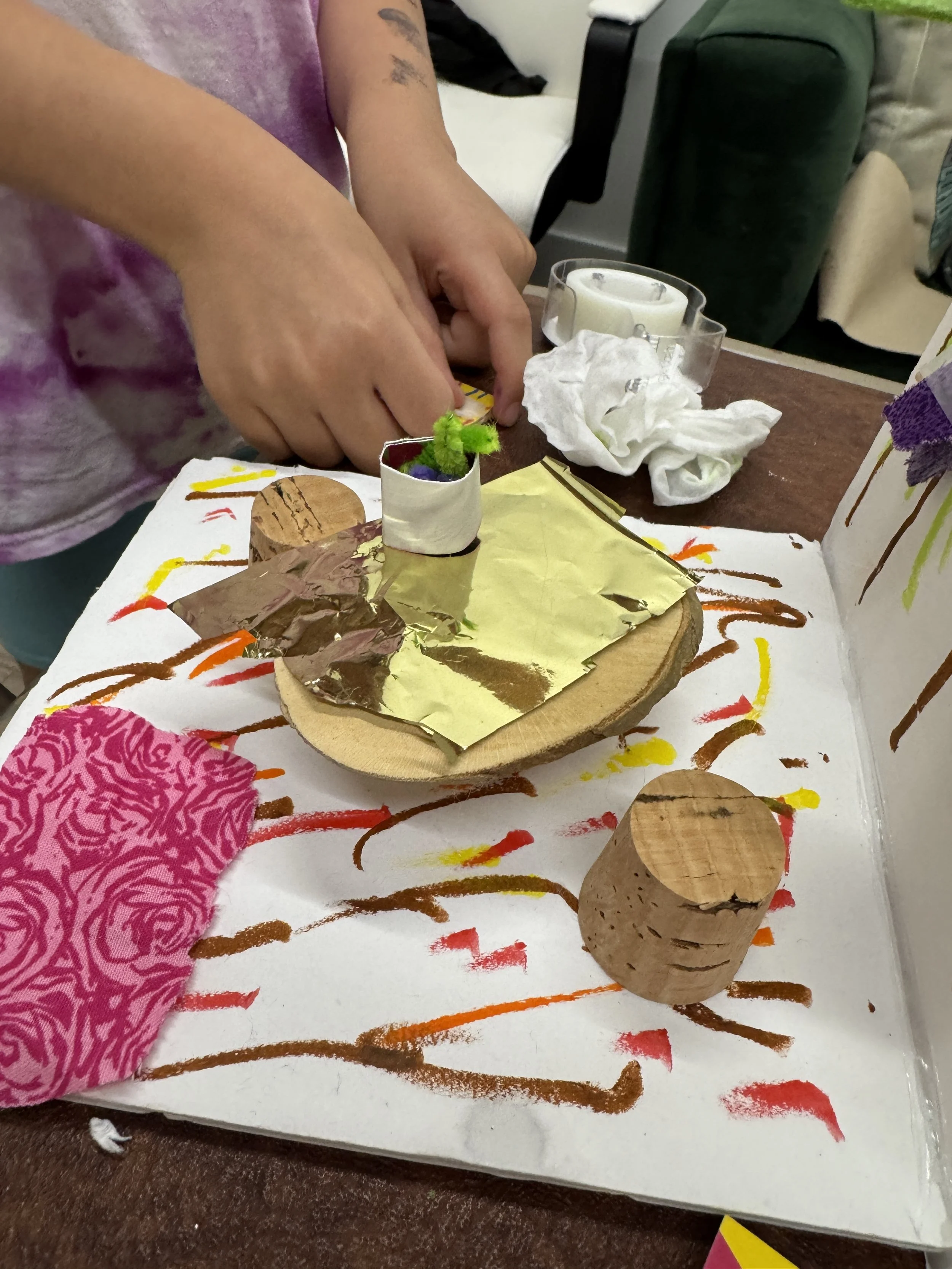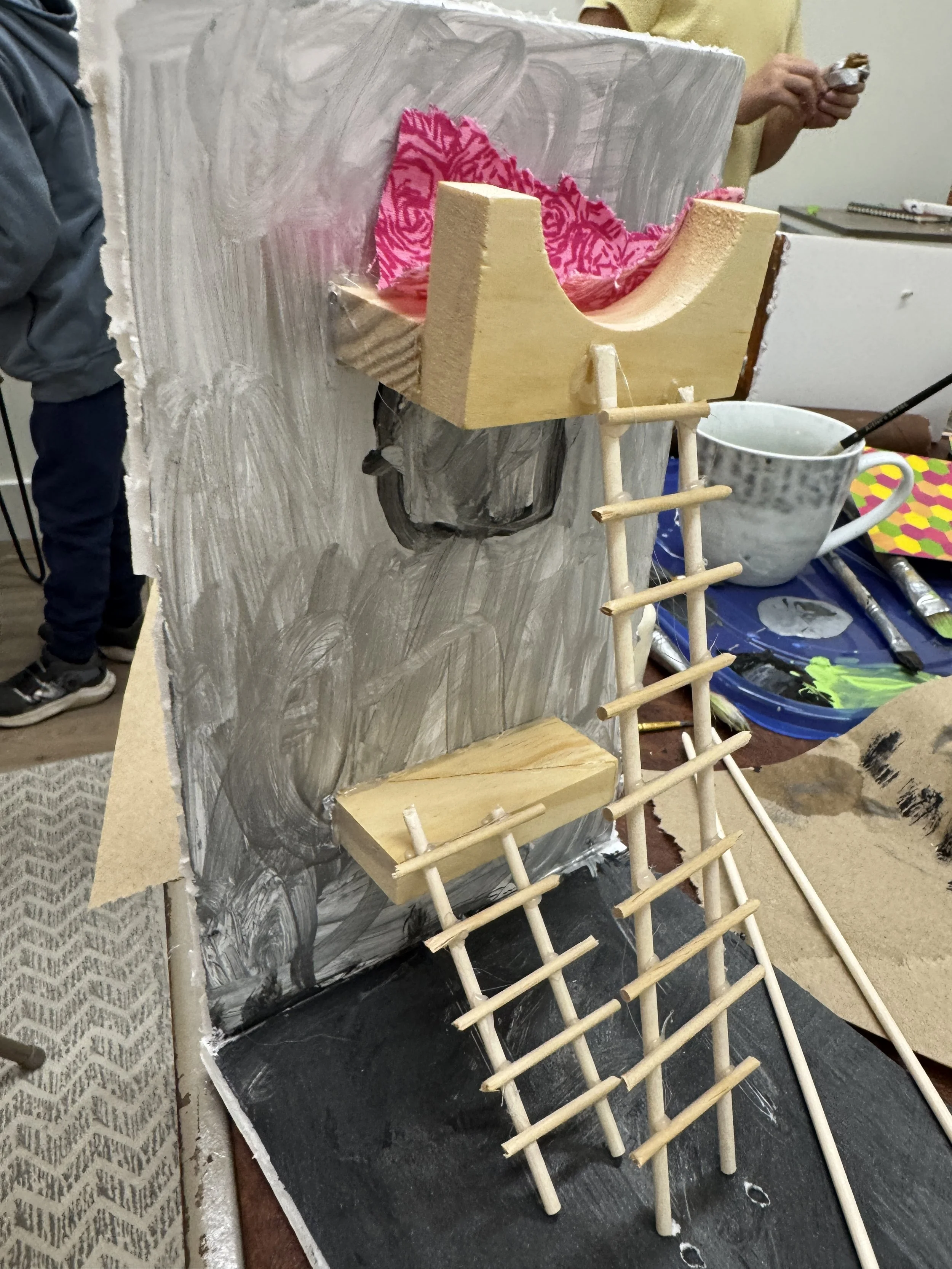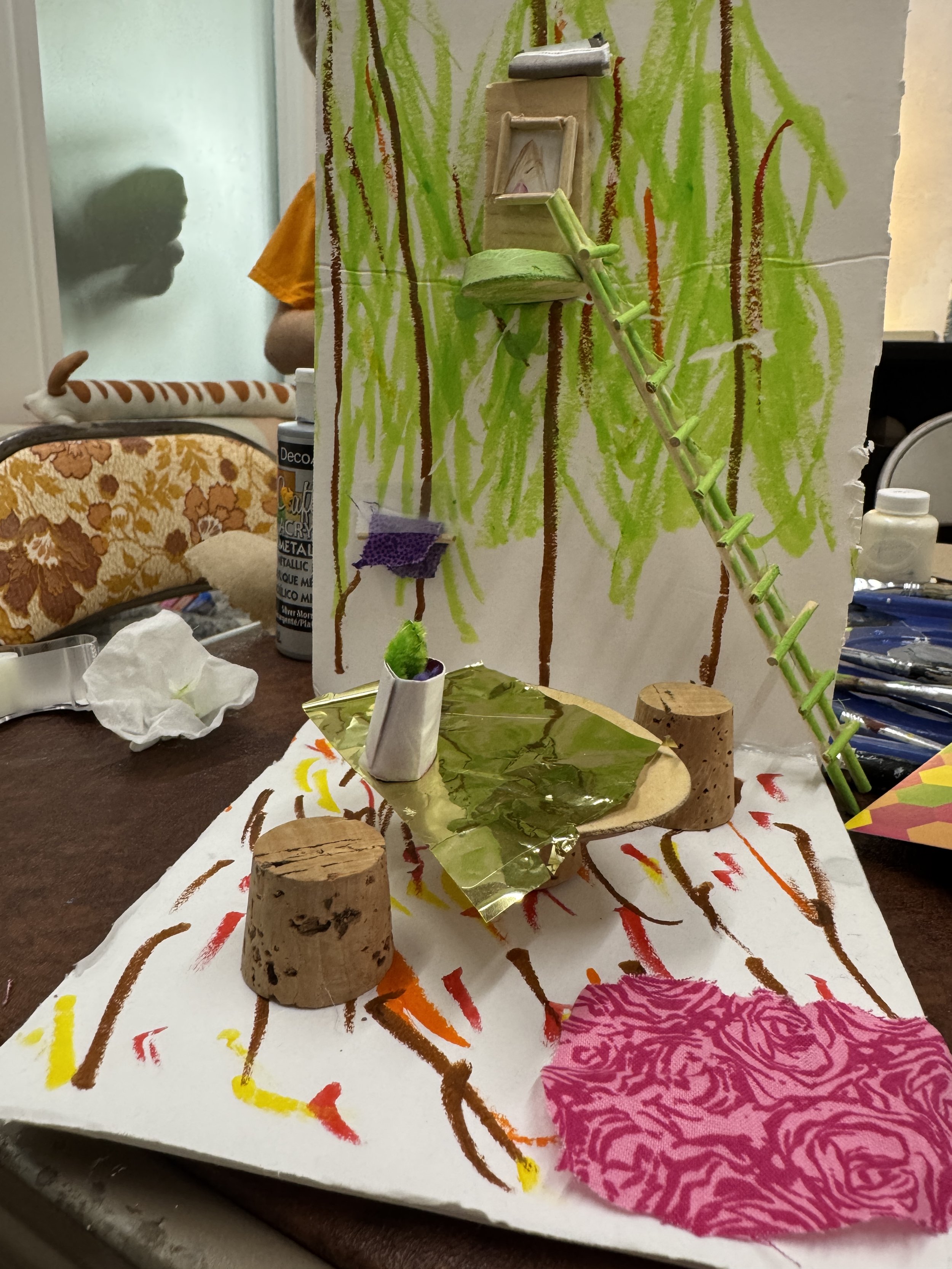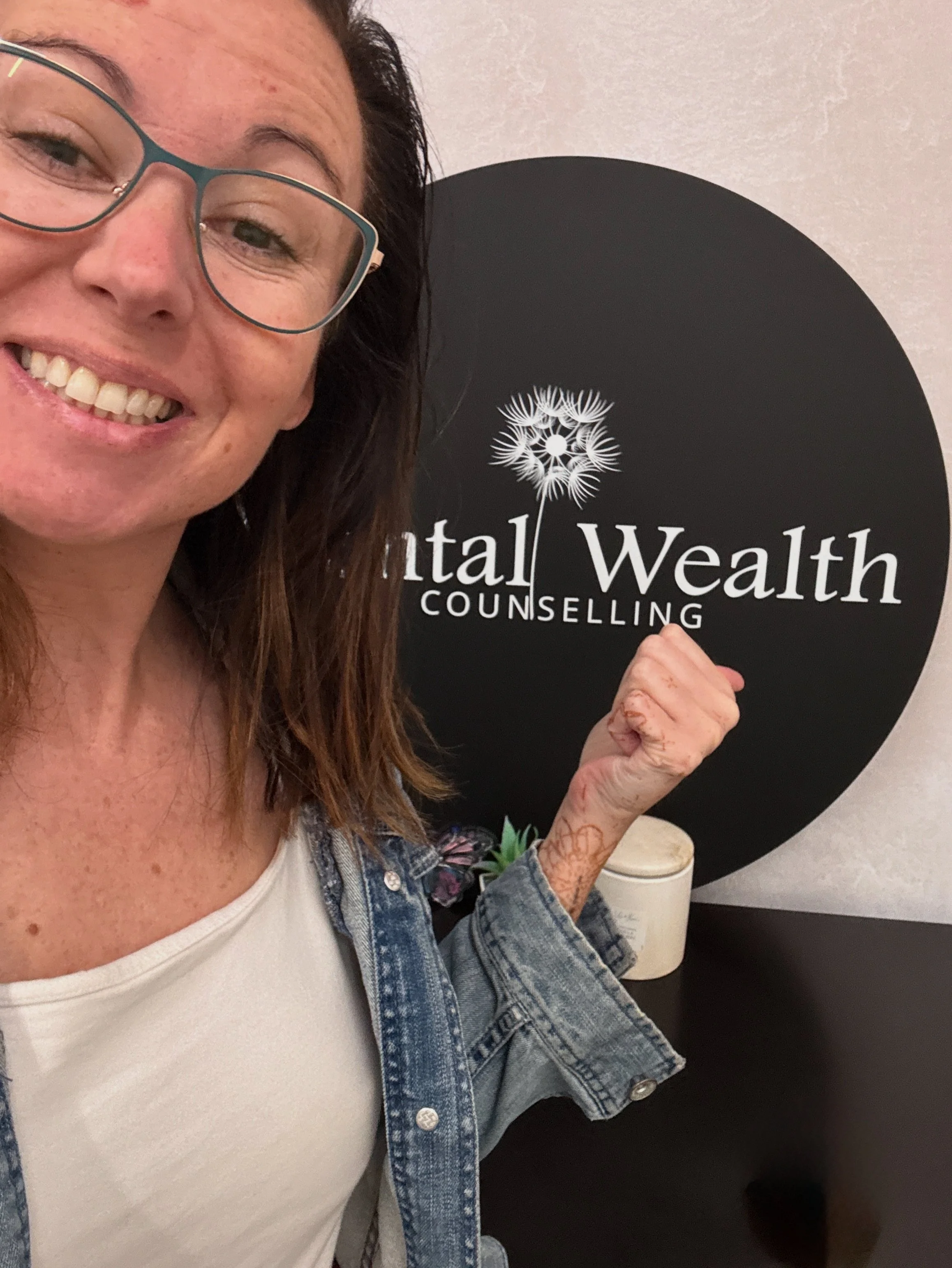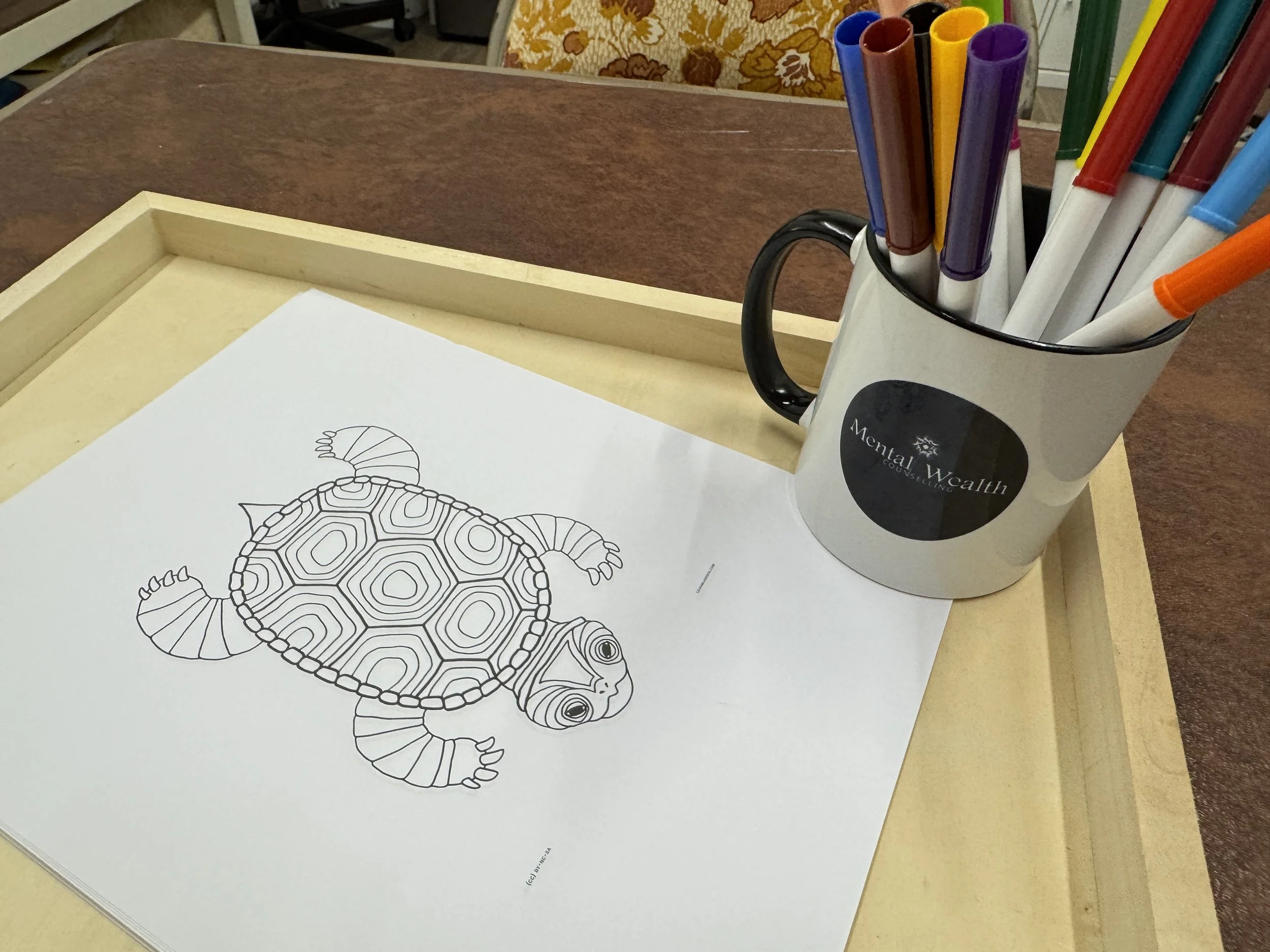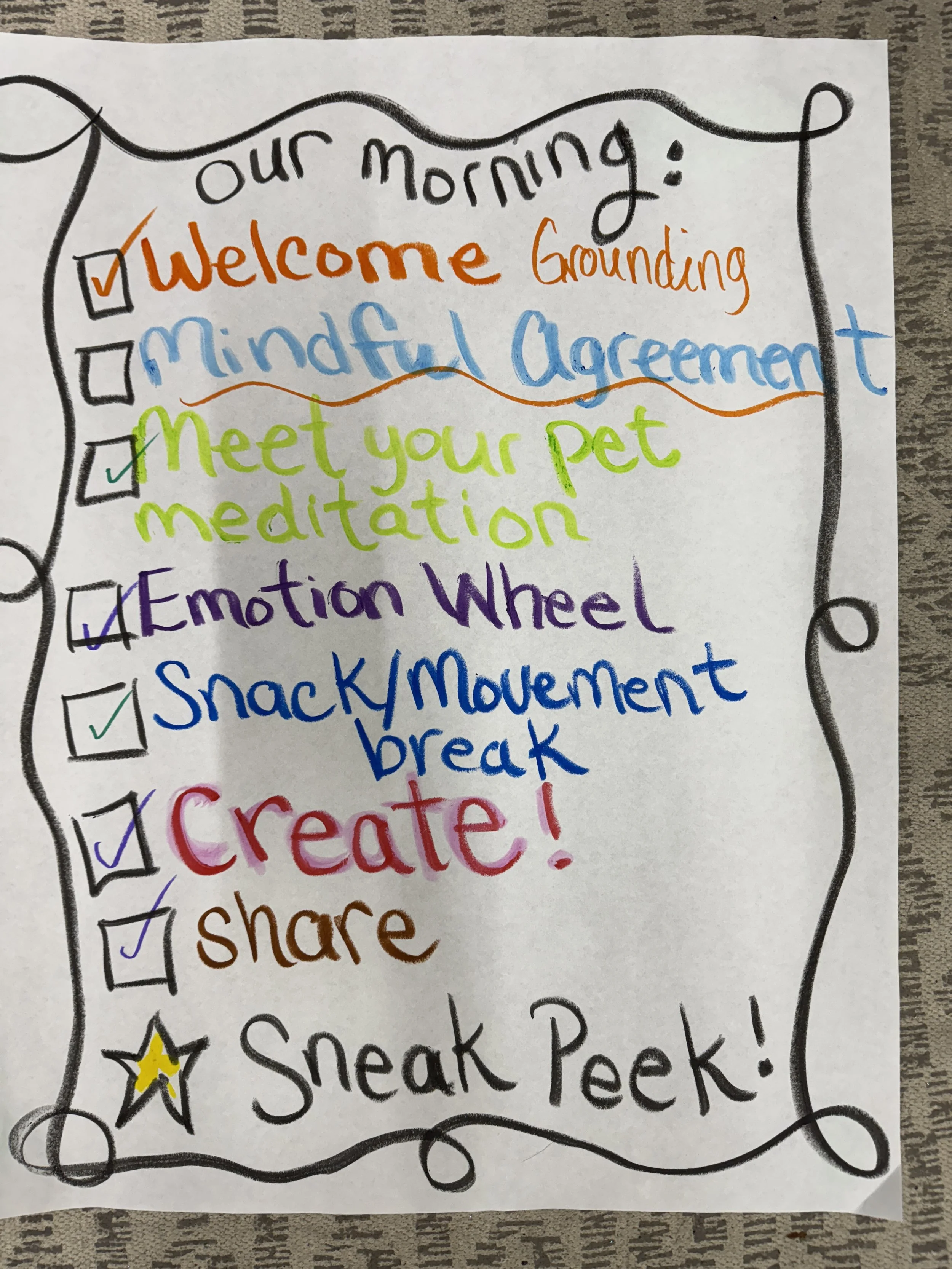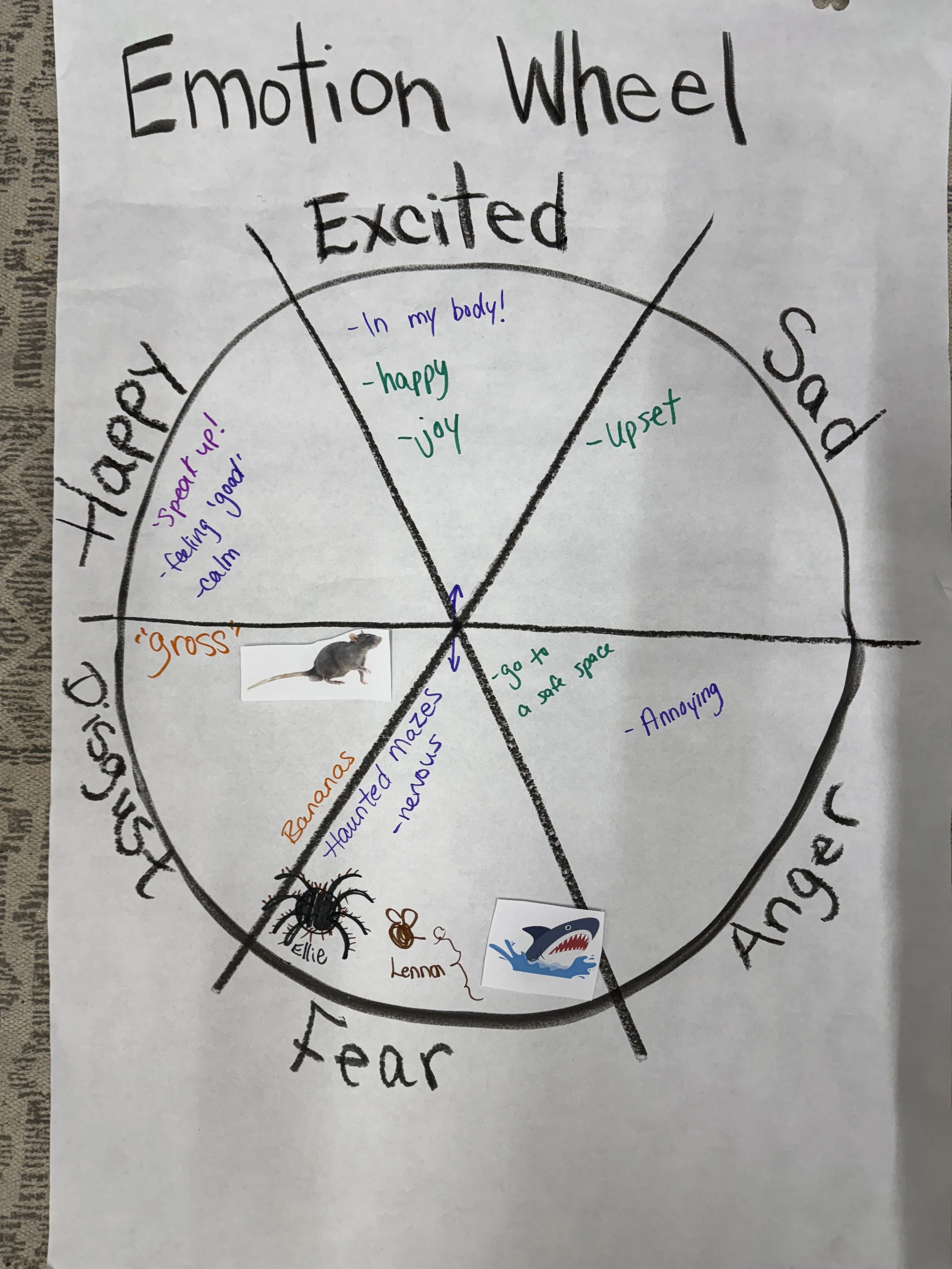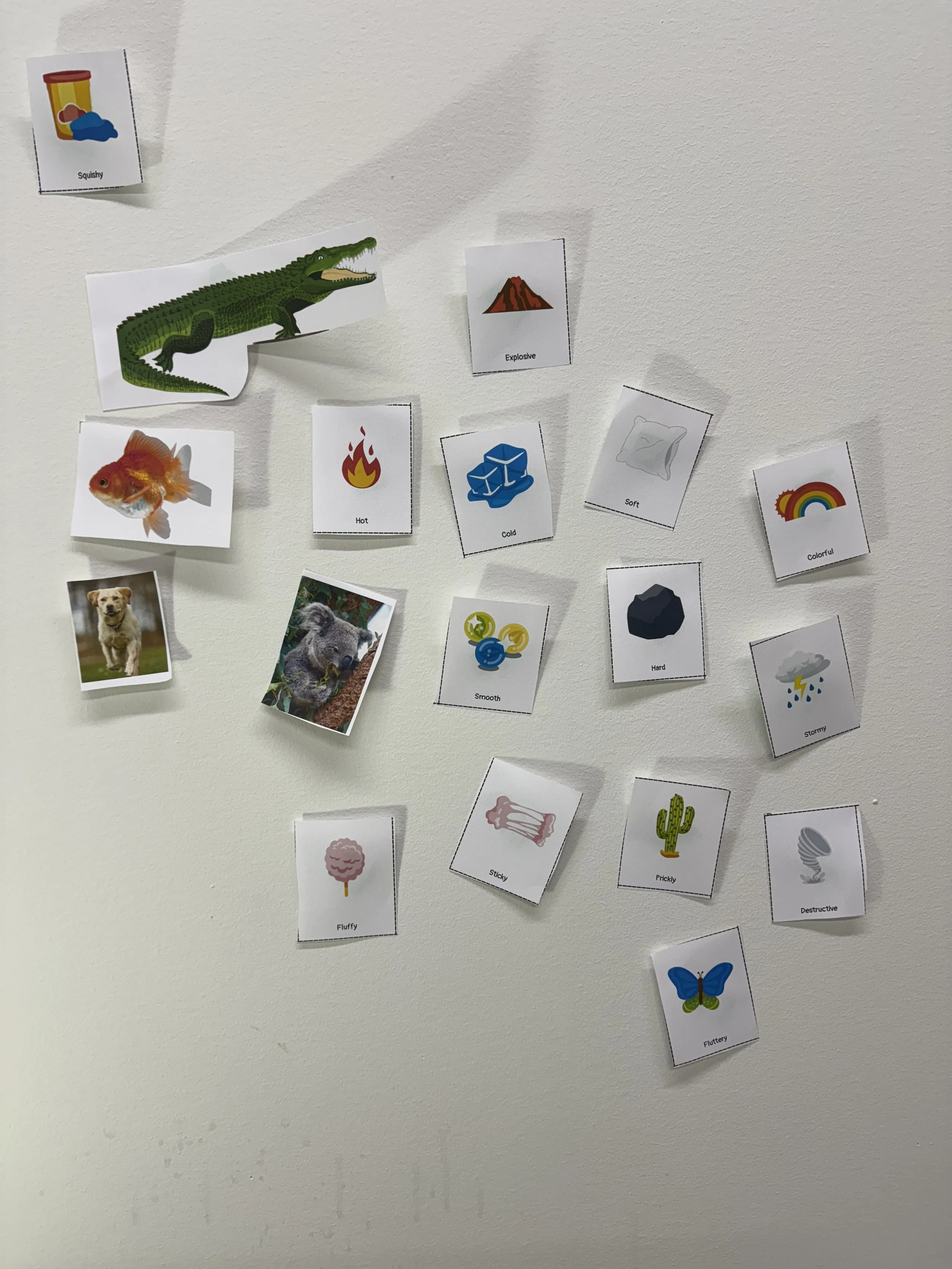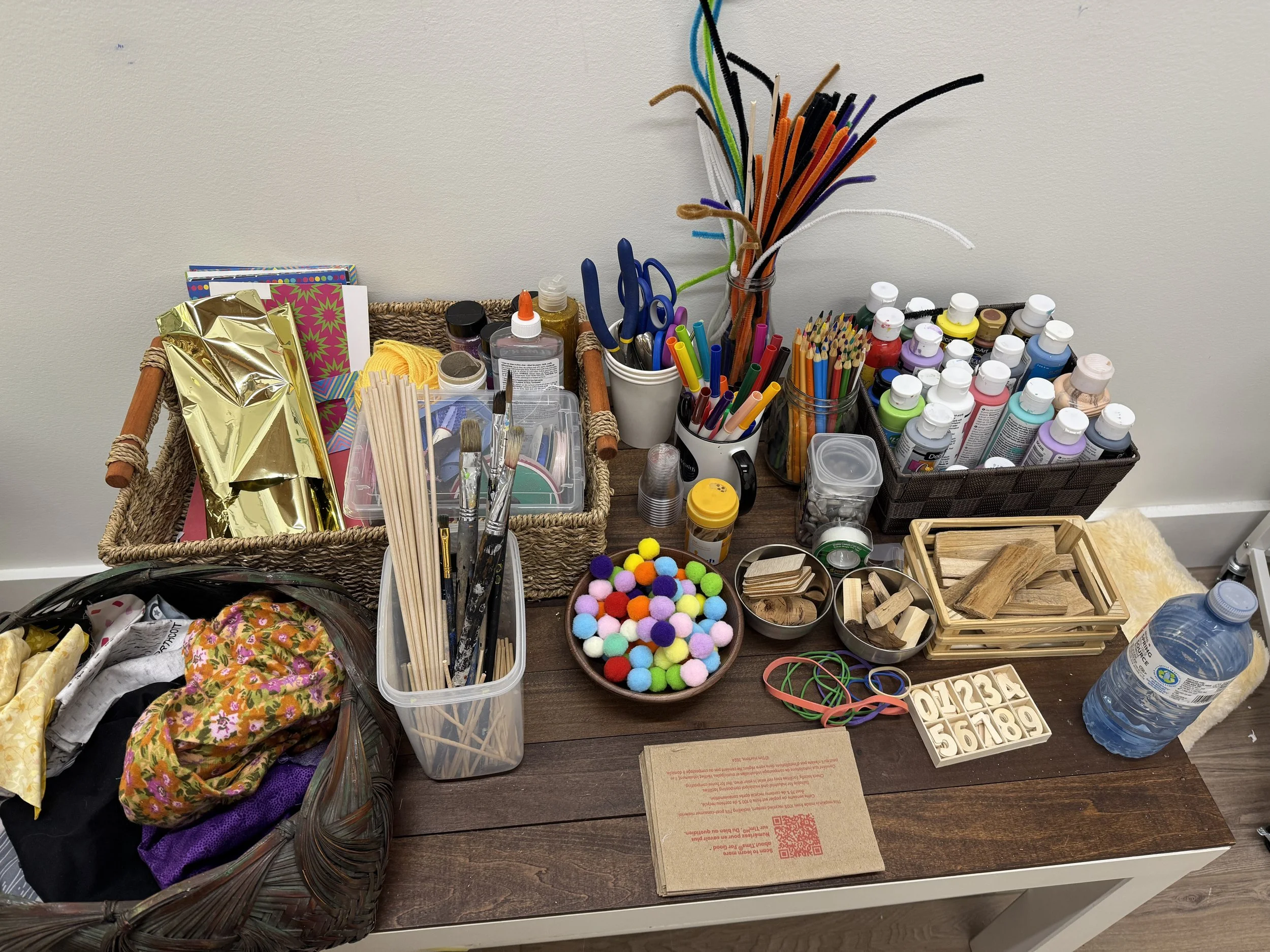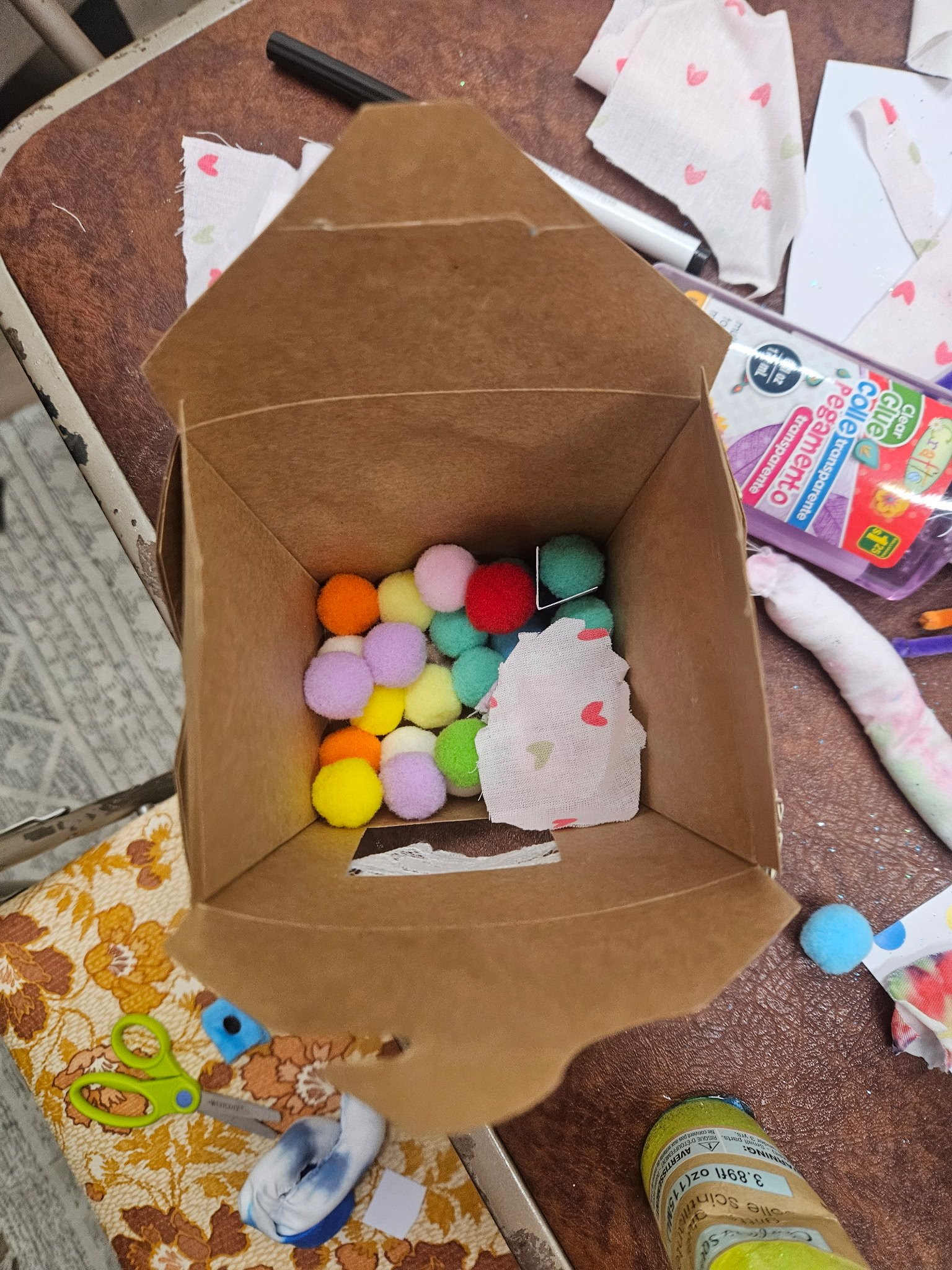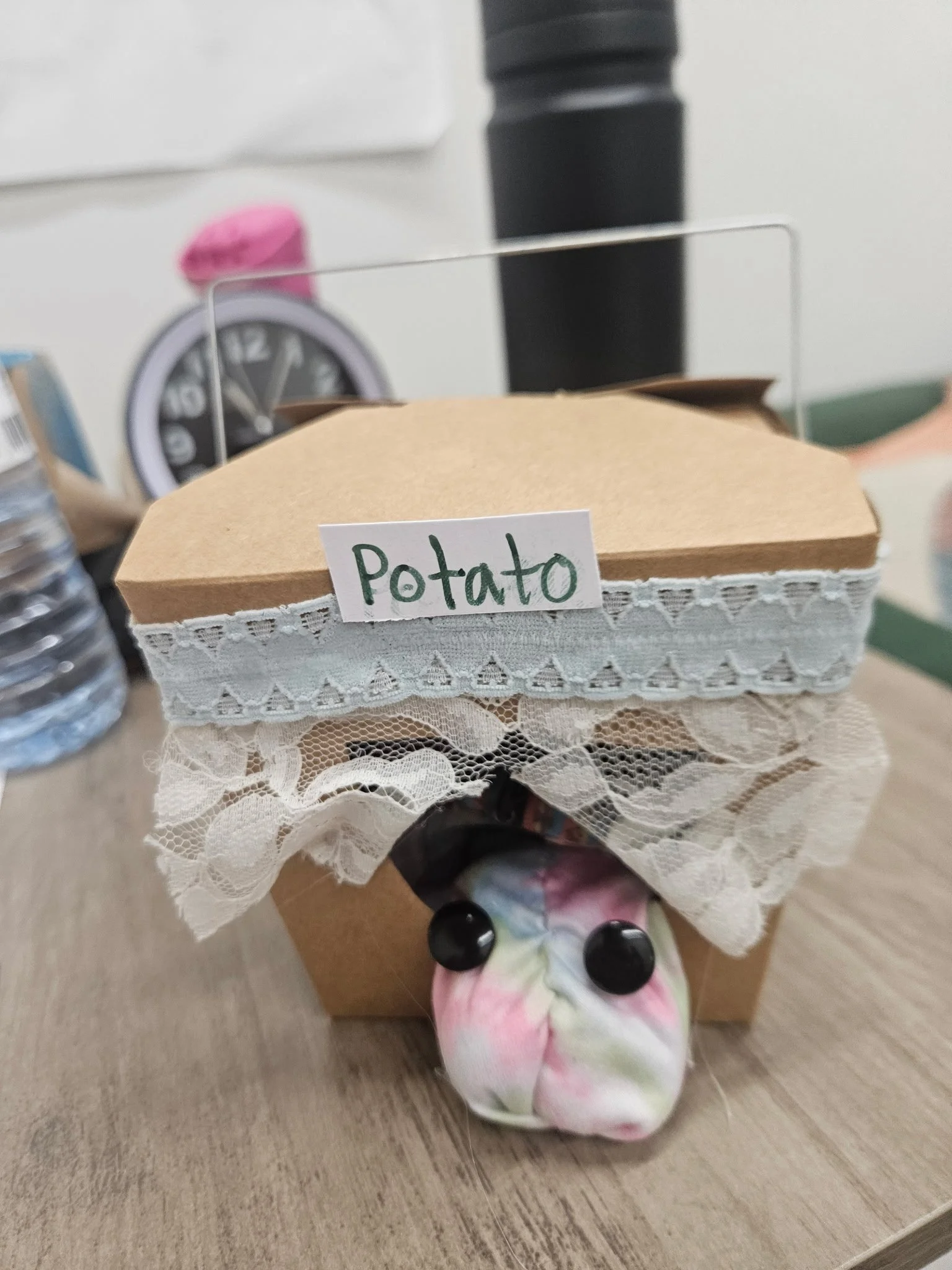Past Creative Counselling Groups
A look back on Wizarding Worries, a psycho educational group for children using narrative therapy and art therapy techniques.
Taking control of our fears through a Magical Lens, Held October 24th, 2025
Mental Wealth Counselling hosted a magical Creative Group called Wizarding Worries, inspired by the enchanting world of Harry Potter—specifically the Boggart, a creature that takes the shape of our deepest fears. Just like in the books, our young wizards learned that fear loses its power when we can name it, reshape it, and even laugh at it.
Throughout the day, children explored their anxieties through creative and empowering activities. They crafted magic wands to symbolize their inner strength, made potion breathing jars to help regulate big feelings, and sculpted their fears out of clay—only to transform them into something silly and safe. One child turned a terrifying shark into a Gummy Shark with no teeth, while another bravely shared her fear of tools after a past injury. With courage and humor, she sculpted a drill press that didn’t drill, but instead poked a whoopie cushion, sending the entire room into joyful laughter.
These moments of vulnerability, creativity, and connection gave children a sense of power over their fears. They left the group not only with handmade tools for emotional regulation, but also with a renewed sense of pride and confidence—truly the ultimate goal of any therapeutic group.
Wizarding Worries reminded us all that when fear is met with imagination and community, it can be transformed into something far less scary—and even a little bit magical.
A reminder that Wizarding Worries is available for individual or small group booking through our booking site by selecting “Creative Counselling (105 minutes)”, under Team Member, Jenny Robertson, MSW Intern.
Past Creative Counselling Groups
A psycho education group for children creating miniature safe spaces out of materials in our maker spaces. The feeling of safety and recognizing when we need to retreat and recharge.
Creating Mini Safe-Spaces to escape to, Held September 26th, 2025
At Mental Wealth Counselling, we recently reflected on the heartwarming session of our Mindful Minis Creative Counselling Group—and what a magical day it was!
Designed for young minds eager to explore their inner worlds, this group invited participants to dive into emotional awareness using the emotion wheel. Children discovered that emotions can be expressed in many ways, and that each feeling has its own unique texture, color, and rhythm. Through playful exploration of sensory items—from calming scents to cozy textures and evocative sounds—kids learned how their bodies respond to different emotional cues. The room was filled with laughter, curiosity, and a growing sense of community as children shared their discoveries with one another.
One of the most memorable moments came during a guided meditation about a bear nestled in a cozy cave. This gentle visualization helped participants reflect on the importance of having a safe space to retreat to—just like animals do in nature. We then explored the science behind this instinct, connecting it to our own need for comfort, regulation, and emotional safety.
Inspired by this insight, each child created their own miniature safe space to take home—a tangible reminder of the calm and security they can access anytime. The creativity was astounding! Some children recreated nostalgic spaces from their past, while others imagined entirely new havens filled with personal meaning. The storytelling that emerged during this activity was rich and heartfelt, revealing the depth of each child’s inner world.
Now, each participant has a visual anchor—a safe space they can return to when life feels overwhelming. It was a day filled with connection, creativity, and emotional growth. We’re so proud of our Mindful Minis and grateful for the joy they brought to this special group.
A reminder that Mindful Minis is available for individual or small group booking through our booking site by selecting “Creative Counselling (105 minutes)”, under Team Member, Jenny Robertson, MSW Intern.
Past Creative Counselling Groups
Creative Kids' Groups: Building Emotional Wellness Through Art & Story
Led by Kate Griffin, Registered Social Worker, and Jenny Robertson, MSW Intern, our Creative Groups offer a unique blend of therapeutic play, art-making, and narrative exploration for children in Grades 1–6. These groups are designed to help kids learn essential mental wellness skills—like understanding emotions, managing anxiety and stress, and practicing self-regulation—through engaging, hands-on activities. By combining creative therapeutic techniques with a warm, community-focused environment, children build emotional resilience, confidence, and connection with others.
Featured here, Name it to Tame it Group.
Name it to Tame it: Exploring Emotions Through Creativity
A Hands-On Journey into Emotional Awareness, Held September 13th, 2025
In the world of emotional regulation, there’s a simple yet powerful idea: “If you can name it, you can tame it.” Recognizing and naming emotions are the first steps toward understanding and managing them — especially for children who are just beginning to explore their inner worlds.
In this psychoeducational creative group, children came together to learn about the wide range of emotions we experience and how those feelings can show up in our bodies. Using the Emotion Wheel, they discovered just how many different ways we can feel — from joy and excitement to frustration and worry.
Through open conversation and shared stories, participants connected with one another, reflecting on times they had experienced various emotions. To bring these lessons to life, each child then created a home for a new “pet”, thoughtfully filling it with items meant to bring their pet comfort.
Each creation was as unique as the child who made it — some cozy and colorful, others imaginative and full of surprises. As they worked, children shared the stories behind their choices, weaving heartfelt narratives about care, empathy, and understanding.
This activity offered more than just creative expression — it gave children the tools to recognize, name, and nurture their emotions in a fun and meaningful way.
A reminder that Name it to Tame it is available for individual or small group booking through our booking site by selecting “Creative Counselling (105 minutes)”, under Team Member, Jenny Robertson, MSW Intern.
Recognizing When to Seek Professional Counselling for Mental Health: Signs and Benefits
Recognizing when it’s time to seek professional counselling for your mental health is a crucial step toward overall wellbeing. Many of us try to manage mental health concerns such as stress, anxiety, and depression on our own, but there are times when expert support and guidance is needed to make significant change. In this post, we will explore some signs that it may be time to seek professional support, as well as how counselling can help you move towards a healthier, more balanced life.
Signs You Should Consider Professional Counselling
Persistent Emotional Distress
If you notice yourself struggling with persistent feelings of sadness, distress, anxiety, or anger, it may indicate a need for professional help.
Difficulty Coping with Life Changes
Major life changes like divorce, loss of a loved one, health issues, or career transitions can be overwhelming. A counsellor can help you navigate these changes in a supportive space.
Relationship concerns
If you are experiencing persistent patterns of conflict, communication challenges, trust issues, emotional disconnect, or intimacy problems in your relationships, counselling may be needed to help you work through your challenges in a healthier way to reach a more connected and satisfied place in your relationship.
Unhealthy Coping Mechanisms
If you’re struggling to cope with life’s challenges and find yourself turning to unhelpful coping mechanisms such as substance abuse, self-harm, overeating or undereating, avoidance, aggression, or impulsive spending, you may need the help of a professional counsellor.
Unexplained Physical Symptoms
If you notice physical symptoms such as headaches, changes in appetite or weight, tension, pain, fatigue, digestive issues, dizziness, or frequent illness that cannot be explained by another condition, they may be related to problems with mental health that a professional counsellor can help address.
Sleep Disturbances
Various mental health concerns can interfere with sleep, such as anxiety, chronic stress, depression, and PTSD. Persistent sleep disturbances can significantly hinder your daily functioning by interfering with energy levels, mood, memory, concentration, and decision-making. These consequences can further exacerbate mental health issues and lead to physical health problems as well. If you find yourself having unexplained difficulties with sleep, seeing a counsellor can help you determine whether underlying emotional struggles need to be addressed to improve your sleep.
Feeling Stuck
If you feel stuck or unmotivated, you may want to consider seeing a counsellor to explore your goals, values, and passions to lead a more fulfilling life.
Isolation and Withdrawal
Losing interest in previously enjoyable activities and withdrawing from friends and family may indicate underlying issues that a counsellor can help address to help you stay connected to your support network.
Benefits of Professional Counselling
Safe Space
Counselling allows you to express your thoughts and feelings in a space that is confidential, non-judgemental, and supportive. It can be difficult to be vulnerable with someone you’ve just met, which is why it’s important to find a counsellor who you feel comfortable with and can build good trust and rapport with over time in order to receive the validation and support you need.
Identifying Patterns and Triggers
A counsellor can help you notice unhelpful behavioural and thought patterns, as well as triggers that lead to emotional distress. Awareness is the first step in making meaningful change, as you can’t change harmful patterns without first being able to identify when they’re occurring.
Behavioural Changes
After unhealthy behaviours have been identified, a counsellor can help you change these behaviours by looking at the root causes and replacing the behaviours with healthier ones.
Improved Relationships
Couples and family counselling can be especially helpful if you have persistent concerns with any relationships in your life. These types of counselling allow for multiple perspectives to be heard in a space where a professional can help guide the individuals involved towards better communication, conflict resolution, mutual understanding, and strengthened connections.
Skill Development
Counselling can help you develop and improve various skills such as coping, communication, problem-solving, and goal-setting skills. Notably, counselling can be very helpful for learning to better regulate and manage emotions.
Despite the stigma that still exists surrounding counselling and mental health in general, recognizing when you need professional support for your mental health is an act of self-care, courage, and resilience. Counselling is an excellent support for your journey towards healing and wellness. Counsellors are able to help you develop the awareness and tools you need to enhance your mental health and better cope with life’s stressors. If you find yourself struggling with any of the signs mentioned in this post or with any other concerns that negatively impact your life, consider reaching out to a counsellor for expert support and guidance.
Elevate Your Mind: The Profound Mental Health Benefits of Intentional Exercise
With all the busyness and distractions of modern life, it’s easy to overlook the significant connection between physical activity and mental wellbeing. While the benefits of exercise on our physical health are well-documented, its impact on mental health is equally important, yet sometimes overlooked. In this post, we’ll explore the transformative power of intentional exercise on mental health and strategies to incorporate it into your routine.
Mental Health Benefits of Intentional Exercise
Stress Reduction and Mood Elevation
Exercise alleviates stress through various physiological and psychological mechanisms. Physical activity stimulates the release of neurotransmitters which act as natural painkillers and mood elevators, decreases production of stress hormones like cortisol and adrenaline, and promotes muscle relaxation, signalling to the brain that you are not in danger. Exercise also provides you with a healthy distraction from negative thoughts and feelings and can be an outlet for frustrations. All these factors work together to significantly reduce stress and anxiety and contribute to a more positive mood.
Increased Self-Esteem
Exercise can improve your self-esteem through the achievement of fitness goals that you set for yourself, increasing your feelings of competence, self-efficacy, and mastery. By reaching a specific weight you can lift or running a certain distance, you can foster pride and confidence in yourself and your abilities. Regular exercise also supports a positive relationship with your body, decreasing the likelihood of engaging in negative self-talk, and further increasing your self-esteem.
Improved Cognition
Exercise has been found to increase cognitive functions such as learning, memory, attention, and problem-solving. It does so by increasing blood flow to the brain, influencing the release of neurotransmitters that play key roles in cognition, and increasing brain plasticity (the brain’s ability to adapt to experiences and environmental changes). Regular exercise has also been found to reduce the risk of age-related cognitive decline.
Improved Sleep Quality
Regular exercise contributes to better sleep quality by helping regulate your circadian rhythm (which governs the sleep-wake cycle), making it easier to fall asleep and wake up. Exercise also improves the structure of sleep by increasing the length of deep sleep and increasing REM (rapid eye movement) sleep, resulting in improved physical and mental benefits. By depleting your energy, exercise can also make you more tired by the end of the day and more likely to sleep longer during the night. The benefits that exercise has for sleep are also related to its other mental health benefits. By reducing stress and anxiety, which tend to interfere with sleep quality, exercise can help you have a more restful sleep.
Increased Energy Levels
Regular exercise increases your energy levels. This may seem counterintuitive, especially because exercise improves sleep partially by depleting your energy, creating a greater sleep debt by the end of the day. However, that is a short-term effect and over the long term, exercise leads to improvements in mood, sleep, physical fitness, and metabolic function that work together to boost your energy levels.
Strategies to Incorporate Exercise into Your Routine
Find Activities You Enjoy
Choose Activities that bring you joy. Whether it’s dancing, hiking, yoga, walking, or swimming, finding joy in exercise will help it become a sustainable and fulfilling part of your routine.
Start Small and Gradually Increase
To avoid feeling overwhelmed or discouraged, start with manageable goals. For example, your initial goal may be to walk for 30 minutes a day, then to start alternating between walking and jogging, and gradually increase the time spent jogging as your fitness level increases. You can increase intensity or duration to help build exercise as a habit.
Prioritize Consistency Over Intensity
Consistency with physical activity is key to receiving its benefits. Strive for regular moderate-intensity workouts instead of sporadic, intense sessions. Consistent workouts that are moderate in intensity are also gentler on your body, allowing you to properly recover and reducing the likelihood of injuries.
Incorporate Exercise into Daily Activities
There are many opportunities to add intentional exercise into your day. For instance, choosing to take stairs over elevators if you have the physical ability to do so, adding stretch breaks into your day, cycling instead of driving to work if possible, or even doing some crunches or jumping jacks while you watch TV.
Create a Routine
It can be helpful to set and commit to a specific time for exercise every day, such as yoga in the morning or a walk after lunch or dinner. Having a designated time to exercise can help you build a consistent routine.
Make it Social
Try joining a workout class, exercising with a friend, or participating in group sports to make exercise more enjoyable. Making your physical activity social will also add accountability, making you more likely to commit to your workout session.
Combine Exercise with Mindfulness
Integrating mindfulness into your physical activity will enhance the mental health benefits of it. There are many ways to do this, whether you focus on how the movement feels, your breath, or your surroundings. Another way to incorporate mindfulness into your workout routine is to track your progress through an app, journal, or calendar. Being able to see how far you’ve come allows you to celebrate your hard work and success.
Reward Yourself
It’s important to reward yourself for your commitment to physical activity and overall wellness and health. Rewarding yourself will also help you stay motivated to continue tackling your exercise goals. Whether it’s treating yourself to a favourite snack or meal, buying some new workout clothes or equipment, or planning a fun activity, find a reward that will work for you and keep you motivated.
It can be intimidating to start exercising regularly; however, it is a powerful tool in enhancing your mental and physical health. Remember, exercise is a personal journey, and there’s no one-size-fits-all approach. Find what works best for you and prioritize it in your routine. Whether it’s a morning yoga session, a daily walk, a dance class, or whatever else you can think of, embrace the journey, and discover what brings you joy and fulfillment. And remember, every small step forward is a victory worth celebrating.
